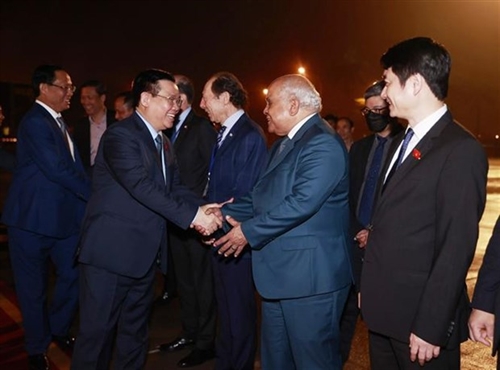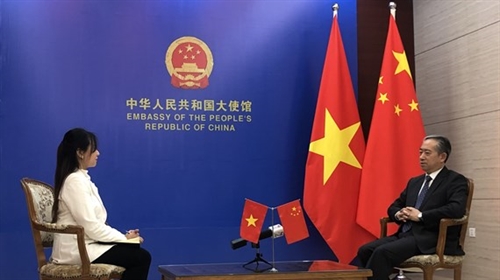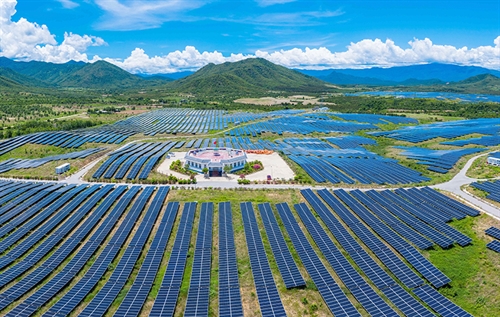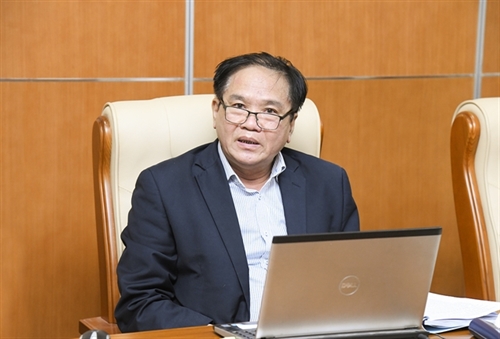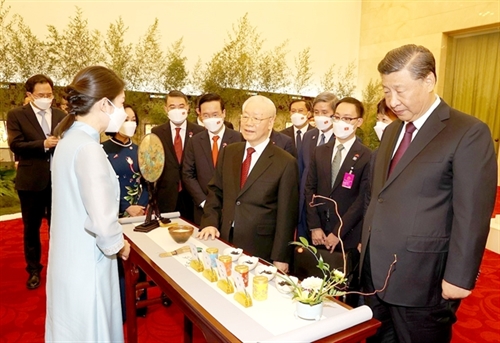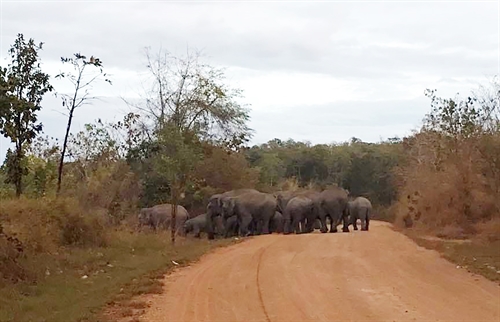Dao Trung Chinh, Director of the Department of Planning and Land Resource Development under the Ministry of Natural Resources and Environment, talks to the Natural Resources and Environment magazine about results of the consultation on the draft revised Land Law.
How do you evaluate the results of the process of consultation with the people on the draft revised Land Law as directed by the National Assembly Standing Committee, Government and Prime Minister?
The consultation process has been a highly significant socio-political activity, attracting the attention of a wide range of people, intellectuals and overseas Vietnamese (with the direct participation of the Ministry of Foreign Affairs through representative missions and embassies of Vietnam abroad), organizations and businesses operating in Vietnam.
Information dissemination and public communication by media agencies have been carried out regularly, continuously and extensively throughout the country, reaching every hamlet, village and residential quarter. Many newspapers and magazines have opened columns for the people to give their opinions on the contents of the draft Law.
Conferences, workshops and topical discussions have been organized by ministries, sectors, localities and agencies with great efforts and demonstrated the proactivity and deep concern of the entire population about the draft revised Land Law. In addition, many individuals have devoted their enthusiasm to studying and giving specific and detailed opinions on the draft.
As of March 15, the deadline for collecting opinions under Resolution 671, we received 7,979 direct opinions and 75 documented opinions (including 22 opinions from organizations and 53 opinions from individuals) via the Ministry of Natural Resources and Environment (MONRE)’s website luatdatdai.monre.gov.vn.
In addition, the drafting agency has so far received 98 documented opinions, including 36 from organizations and the rest from citizens. The MONRE has also summarized contributions from ministries, sectors, localities and organizations.
As of March 24, 46 provinces and cities and 31 ministries and government agencies nationwide had already given their opinions.
What is your opinion on the received feedback? Which specific contents do contributed opinions focus on?
Most of received opinions agree with the basic contents of the draft. The draft has been evaluated to have many novel provisions, meeting the needs and aspirations of the people, utilizing land resources for the socio-economic development, and contributing to the tightened management and efficient use of land.
The majority of opinions focus on land master plans and land use plans, land recovery, and compensation, support and resettlement policies; land allocation, land lease, and land repurposing; land finance policies and land prices; land registration, land certification, administrative procedures, land data and information; commercialization of annual land rental rights and optional modes of land rental payments; land management and use regulations; public land areas, land areas with underground facilities, and airspace use rights; the role of the Vietnam Fatherland Front and its members; the role of commune-level People’s Committees; development of the land fund; power delegation, monitoring and control; household land use; handling of laws that conflict and overlap with the draft revised Land Law.
As the opinions received are very diverse, from many different perspectives, even conflicting in some cases, how can we maximize the incorporation of these opinions and based on what criteria?
To keep up with the assigned schedule, the drafting agency has simultaneously confirmed the reception of opinions and proceeded with feedback since March 15. The MONRE and the drafting team have focused on reply and explanation about the reply to people’s opinions in the spirit of “doing as much as possible.”
To date, every feedback has been thoroughly analyzed by the MONRE and the drafting team. There have also been exchanges with the related agencies of the National Assembly, relevant ministries and sectors in order to reach consensus on the draft.
Contents subject to divergent opinions and for which a consensus has not yet been reached will be summarized and reported in detail to the Government and National Assembly for specific opinions. The reply and explanation will be carried out for every opinion, and reported to the Government and National Assembly, and publicly disclosed in accordance with the law on promulgation of legal documents.
Regarding the criteria for reply and reply explanation, we are focusing on appropriate, consistent and practical elements. Opinions that are in line with the Constitution and Party’s guidelines, and comply with relevant laws and have practical value, will be accepted and assimilated. Meanwhile, issues contrary to general policies will be clearly explained, and those of practical value but not yet incorporated in the Constitution and Party’s guidelines will be reported to competent authorities for consideration.
As you said, issues related to land finance mechanisms and land prices have received lots of feedback from the people. Are these opinions in favor of the contents of the draft?
The draft’s provisions on land finance mechanisms based on Resolution 18-NQ/TW have some revolutionary features, such as abolishing land price brackets, regulating the management of revenues from land, clearly specifying cases where land price tables and specific land prices may be applied, detailed provisions on land price appraisal councils and specific guidelines on land valuation consultancy.
Particularly, many people agree with the abolition of land price brackets in the hope that land prices will gradually become more aligned with the market.
The annual land price table is also widely supported, though it is suggested that the table should be publicized every two years or three years and adjusted when there arise certain fluctuations.
Additionally, some other opinions suggest that specific regulations should be issued to ensure the appraisal council’s deep expertise, independence, objectivity and transparency.
The principle of market-based land valuation is a relatively new activity in Vietnam, especially given the limited database on land prices. The drafting agency and editorial team will consider and review specific provisions more carefully so as to facilitate effective implementation based on received opinions.
All received opinions will be carefully considered by the drafting agency for appropriate reply and explanation.-
| Overseas Vietnamese give opinions on draft revised Land Law In furtherance of Government Resolution 170/NQ-CP dated December 31, 2022, promulgating the plan on collection of opinions on the draft revised Land Law, the Ministry of Foreign Affairs has organized the collection of opinions from overseas Vietnamese (OVs). In general, OVs welcomed and agreed with the changes contained in the draft revised Land Law as compared with the 2013 version. Also, they have contributed opinions regarding acquisition of residential land use rights, land users, and other land-related issues relating to OVs. Many said that the 2013 Land Law provides OVs with the right to use residential land upon having the ownership of houses, but it is silent about the right to use land without residential buildings. Under Article 169.1.dd, OVs may acquire residential land use rights under housing development projects. Such regulation not only restricts the right to build houses of OVs eligible to own houses in Vietnam but also affects their right to inherit residential land with residential buildings outside housing development projects. Dealing with that problem, the draft stipulates in Article 30.1.g that OVs who are eligible to own houses in Vietnam under the housing law may purchase, lease-purchase and receive inheritance and donation of houses associated with residential land use rights or acquire residential land use rights. In other words, OVs might acquire land use rights without having to purchase residential houses built under housing development projects. In addition, Article 30.1.b provides that economic organizations, individuals and overseas Vietnamese are permitted to acquire land use rights. Accordingly, the right to acquire land use rights of OVs would be like that of domestic economic organizations or individuals residing in the country, which would not be restricted within industrial parks, industrial clusters, export processing zones, hi-tech parks or economic zones as specified in Article 169.1.b of the 2013 Land Law. Many OVs proposed amending Article 47 into: “Overseas Vietnamese who are eligible to own houses in accordance with the housing law may acquire residential land use rights for house construction in accordance with law”. Some OVs expressed their hope that the drafting board considers allowing foreigners who are spouses and children of OVs to acquire residential land use rights through inheritance. Under Article 5.6 of the draft, land users include Vietnamese people residing abroad in accordance with the law on nationality. Some OVs argued that the reference to the law on nationality is confusing and cumbersome, so it should be revised into “Land users include overseas Vietnamese who are permitted to enter Vietnam”. OVs also suggested permission for economic organizations to acquire the right to use land for protection forests and land for special-use forests from individuals. OVs and foreign-invested economic organizations should be eligible for land lease from the State and acquisition of land use rights contributed as capital from economic organization for implementation of concentrated rice cultivation projects. OVs emphasized the necessity to develop policies to ensure food security in the country and concurrently attract investment capital for the sustainable development of rice cultivation.- |
